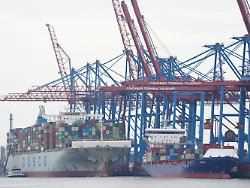Wednesday November 10, 2021
Bottlenecks and Corona are to blame
Economically lower economic forecast
Because of the pandemic, the economy is less optimistic about the German market. If you once assumed growth of 3.1 percent for 2021, you are now lowering the forecast. But everything should get better in 2022.
Because of the ongoing delivery problems, the economic wise men are more skeptical of the economy in Germany. The four economists lowered their growth forecast for 2021 to 2.7 percent, according to the Advisory Council for the Assessment of Overall Economic Development (SVR). For the coming year, however, the experts expect stronger growth of 4.6 percent. The pre-crisis level of the end of 2019 will probably be reached again in the first quarter of 2022.
“The uncertainty about the coming economic development is high,” warn the government advisors, however. “Renewed health policy restrictions or prolonged delivery bottlenecks could put a greater strain on the recovery.” The SVR presents its annual report entitled “Shaping Transformation: Education, Digitization and Sustainability” to Chancellor Angela Merkel and the government. The members of the committee are Volker Wieland, Veronika Grimm, Monika Schnitzer and Achim Truger. So far, the experts had expected a stronger increase in gross domestic product (GDP) of 3.1 percent for 2021 and a lower increase of 4.0 percent for 2022.
Most recently, the leading economic research institutes and the federal government cut their growth forecast for 2021, but increased the estimate for 2022. In general, it is expected that the economic recovery will shift to the next year due to delivery problems. With inflation, which is currently 4.5 percent, its highest level since the end of 1993, economists are only expecting a gradual relaxation.
ECB should end loose monetary policy
Annual inflation should fall from an average of 3.1 percent this year to 2.6 percent next year. The economists warn, however: “Prolonged supply-side bottlenecks, higher wage agreements and rising energy prices pose risks.” As a result, temporary price drivers could actually lead to permanently higher inflation rates.
In addition, the wise men advise the European Central Bank (ECB) to exit its extremely loose monetary policy in good time. The German Council of Economic Experts warns that rising inflation risks and the increasing dependency of public budgets on the low level of interest rates in some member states could develop into a dilemma. “If monetary policy reacts too late or too inconsistently, this can endanger economic development,” said council member Volker Wieland.
The monetary authorities would best contribute to a sustainable upswing by ensuring price stability. Therefore, the end of the pandemic-related monetary policy measures should be considered and a normalization strategy communicated as soon as possible, which should also include a gradual increase in interest rates. This would help stabilize interest rate and inflation expectations.
